This framework aims to share experiences and learnings from Better Work on processes to improve identified non-compliances in garment factories and enable improvements through factory-level social dialogue.
To address these challenges of workplace improvements, leading brands and retailers recognise the need for joint efforts and collaboration to achieve better working conditions and greater resilience in apparel supply chains. Industry leaders collaborate to share best practices to address decent work deficits that can occur at workplaces where apparel is produced. Such collaboration aims to reduce duplicative efforts, promote data reliability, and increase efficiency in improvement processes.
The framework is informed by experience and evidence generated from implementation of the ILO-IFC Better Work programme ensuring compliance with international labour standards and labour law in multiple country contexts over 20 years. While based on the experience in the sector, it is intended to provide key principles that manufacturers, brands, and retailers can use to inform action in improving non-compliances in factories.
The intention is for business partners to internalise and leverage this learning for use in supply chains beyond Better Work’s reach. It focuses on recommended principles and methods to promote respect for labour standards and to improve workplace conditions. It combines preventative measures with remedial actions not only to correct current non-compliance but also to prevent future violations through systemic change. This framework focuses on workplace-level intervention and approaches.
Pursuing sustainable improvement is more comprehensive and ambitious than a traditional compliance auditing exercise. Based on experiences, Better Work programme has shown that it must be rooted in an iterative cycle of continuous improvement that respects and empowers the voice of workers, especially the voices of those historically marginalized at the workplace. It entails the collaboration among brands, retailers, and suppliers who know well the challenges and complexities of operating in supply chains.
